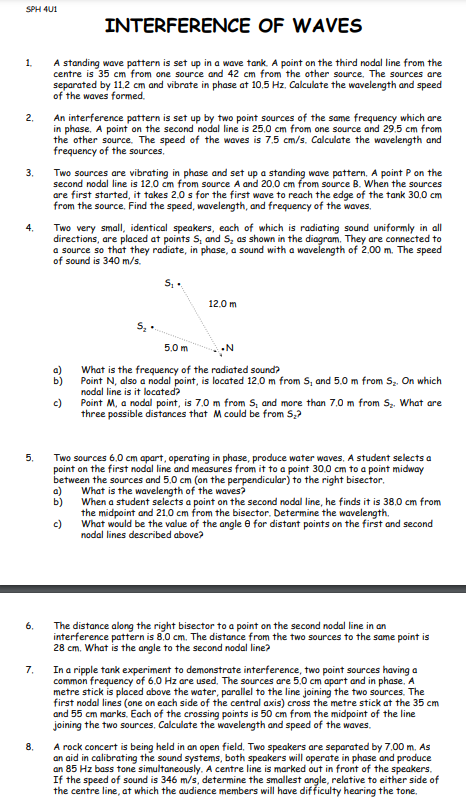Answered step by step
Verified Expert Solution
Question
1 Approved Answer
SPH 401 1 2. 3. 4. INTERFERENCE OF WAVES A standing wave pattern is set up in a wave tank. A point on the

SPH 401 1 2. 3. 4. INTERFERENCE OF WAVES A standing wave pattern is set up in a wave tank. A point on the third nodal line from the centre is 35 cm from one source and 42 cm from the other source. The sources are separated by 11.2 cm and vibrate in phase at 10.5 Hz. Calculate the wavelength and speed of the waves formed. An interference pattern is set up by two point sources of the same frequency which are in phase. A point on the second nodal line is 25,0 cm from one source and 29.5 cm from the other source. The speed of the waves is 7.5 cm/s. Calculate the wavelength and frequency of the sources. Two sources are vibrating in phase and set up a standing wave pattern. A point P on the second nodal line is 12.0 cm from source A and 20.0 cm from source B. When the sources are first started, it takes 2.0 s for the first wave to reach the edge of the tank 30.0 cm from the source. Find the speed, wavelength, and frequency of the waves. Two very small, identical speakers, each of which is radiating sound uniformly in all directions, are placed at points S, and S, as shown in the diagram. They are connected to a source so that they radiate, in phase, a sound with a wavelength of 2.00 m. The speed of sound is 340 m/s. S 12.0 m 5.0 m .N a) b) c) What is the frequency of the radiated sound? Point N, also a nodal point, is located 12.0 m from S, and 5.0 m from S. On which nodal line is it located? Point M, a nodal point, is 7.0 m from S, and more than 7.0 m from S. What are three possible distances that M could be from S? 5. Two sources 6.0 cm apart, operating in phase, produce water waves. A student selects a point on the first nodal line and measures from it to a point 30.0 cm to a point midway between the sources and 5.0 cm (on the perpendicular) to the right bisector. a) b) c) What is the wavelength of the waves? When a student selects a point on the second nodal line, he finds it is 38.0 cm from the midpoint and 21.0 cm from the bisector. Determine the wavelength. What would be the value of the angle e for distant points on the first and second nodal lines described above? 6. 7. 8. The distance along the right bisector to a point on the second nodal line in an interference pattern is 8,0 cm. The distance from the two sources to the same point is 28 cm. What is the angle to the second nodal line? In a ripple tank experiment to demonstrate interference, two point sources having a common frequency of 6.0 Hz are used. The sources are 5.0 cm apart and in phase. A metre stick is placed above the water, parallel to the line joining the two sources. The first nodal lines (one on each side of the central axis) cross the metre stick at the 35 cm and 55 cm marks. Each of the crossing points is 50 cm from the midpoint of the line joining the two sources. Calculate the wavelength and speed of the waves. A rock concert is being held in an open field. Two speakers are separated by 7.00 m. As an aid in calibrating the sound systems, both speakers will operate in phase and produce an 85 Hz bass tone simultaneously. A centre line is marked out in front of the speakers. If the speed of sound is 346 m/s, determine the smallest angle, relative to either side of the centre line, at which the audience members will have difficulty hearing the tone.
Step by Step Solution
There are 3 Steps involved in it
Step: 1

Get Instant Access to Expert-Tailored Solutions
See step-by-step solutions with expert insights and AI powered tools for academic success
Step: 2

Step: 3

Ace Your Homework with AI
Get the answers you need in no time with our AI-driven, step-by-step assistance
Get Started


